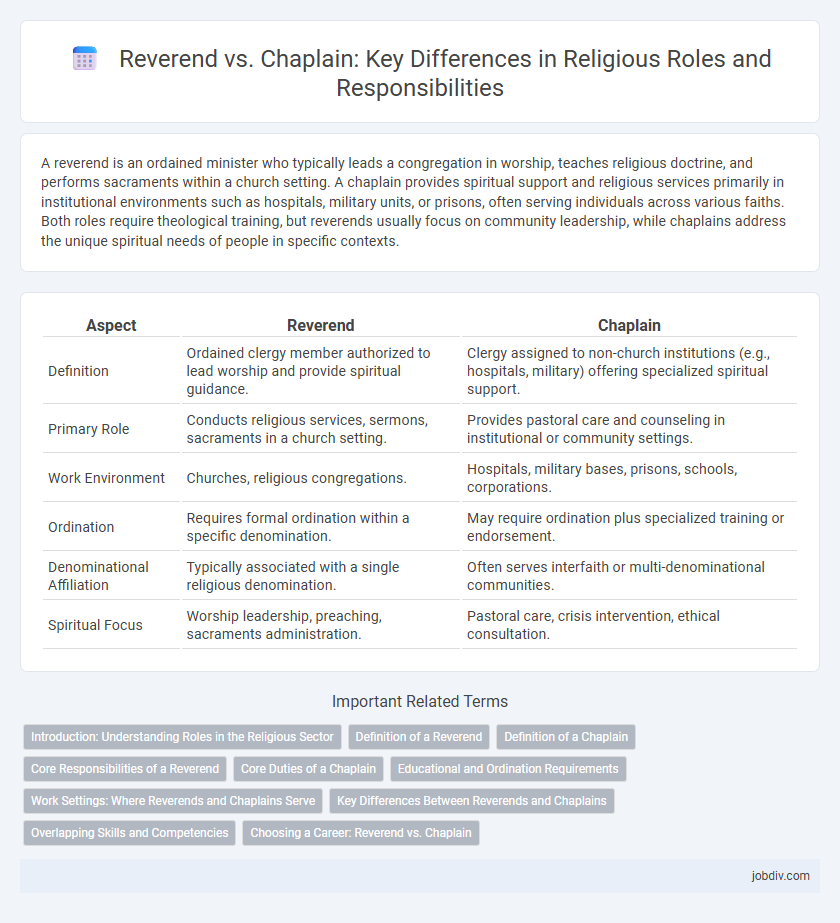A reverend is an ordained minister who typically leads a congregation in worship, teaches religious doctrine, and performs sacraments within a church setting. A chaplain provides spiritual support and religious services primarily in institutional environments such as hospitals, military units, or prisons, often serving individuals across various faiths. Both roles require theological training, but reverends usually focus on community leadership, while chaplains address the unique spiritual needs of people in specific contexts.
Table of Comparison
| Aspect | Reverend | Chaplain |
|---|---|---|
| Definition | Ordained clergy member authorized to lead worship and provide spiritual guidance. | Clergy assigned to non-church institutions (e.g., hospitals, military) offering specialized spiritual support. |
| Primary Role | Conducts religious services, sermons, sacraments in a church setting. | Provides pastoral care and counseling in institutional or community settings. |
| Work Environment | Churches, religious congregations. | Hospitals, military bases, prisons, schools, corporations. |
| Ordination | Requires formal ordination within a specific denomination. | May require ordination plus specialized training or endorsement. |
| Denominational Affiliation | Typically associated with a single religious denomination. | Often serves interfaith or multi-denominational communities. |
| Spiritual Focus | Worship leadership, preaching, sacraments administration. | Pastoral care, crisis intervention, ethical consultation. |
Introduction: Understanding Roles in the Religious Sector
Reverends serve as ordained leaders primarily responsible for conducting worship services, providing spiritual guidance, and administering sacraments within a church community. Chaplains, on the other hand, offer specialized pastoral care and support in institutional settings such as hospitals, military units, universities, and prisons, addressing diverse religious and spiritual needs. Both roles require theological training and ordination but differ in environment, scope, and the populations they serve.
Definition of a Reverend
A Reverend is an ordained clergy member in Christian denominations who is authorized to perform religious ceremonies, preach, and provide spiritual guidance to a congregation. The title "Reverend" signifies respect and is commonly used before the name of ministers, pastors, or priests. Unlike chaplains, who often serve specific institutions such as hospitals, military units, or prisons, Reverends primarily lead church communities and oversee religious services.
Definition of a Chaplain
A chaplain is a clergy member specially appointed to provide spiritual care and guidance in secular institutions such as hospitals, military units, prisons, or universities. Unlike a reverend who typically leads a specific congregation or church, a chaplain serves a diverse population, addressing the spiritual and emotional needs of individuals regardless of their religious affiliation. Chaplains often perform pastoral counseling, conduct religious services, and offer crisis support within interdisciplinary settings.
Core Responsibilities of a Reverend
Reverends primarily lead worship services, provide spiritual guidance, and administer sacraments within a specific congregation, ensuring adherence to religious doctrines and traditions. They offer pastoral care, including counseling and support during life events such as weddings, funerals, and baptisms, fostering a strong community faith experience. Their responsibilities often extend to preaching, teaching religious education, and leading church administration to maintain the spiritual and organizational health of their parish.
Core Duties of a Chaplain
A chaplain primarily provides spiritual support and counseling within institutional settings such as hospitals, military units, prisons, or universities, addressing the specific emotional and religious needs of diverse populations. They conduct religious services, offer crisis intervention, and facilitate interfaith dialogue tailored to the unique environment they serve. Unlike a reverend who often leads a congregation, chaplains operate in specialized fields, ensuring pastoral care is accessible in secular or multi-faith contexts.
Educational and Ordination Requirements
Reverends typically undergo formal seminary education that includes theology, pastoral care, and biblical studies, often culminating in a Master of Divinity degree before ordination by a denominational authority. Chaplains, while also requiring ordination or endorsement from a recognized religious body, must meet specialized training standards related to counseling, ethics, and institutional protocols relevant to hospitals, military, or correctional facilities. Both roles demand rigorous theological education but differ in their additional practical requirements tailored to specific ministerial contexts.
Work Settings: Where Reverends and Chaplains Serve
Reverends primarily serve in churches, religious institutions, and community congregations, providing spiritual leadership, sermons, and pastoral care. Chaplains work in diverse environments such as hospitals, military bases, prisons, and universities, offering spiritual support tailored to specific institutional settings. Both roles engage in counseling and rituals, but chaplains often navigate secular environments requiring interfaith sensitivity.
Key Differences Between Reverends and Chaplains
Reverends are ordained ministers or pastors typically serving congregations, leading religious services, and providing spiritual guidance within a specific denomination. Chaplains, often found in institutions like hospitals, military, or prisons, offer spiritual support and counseling to diverse groups without leading a traditional congregation. The key difference lies in their roles: reverends primarily focus on worship and pastoral care in churches, while chaplains deliver interfaith spiritual care in varied secular settings.
Overlapping Skills and Competencies
Reverends and chaplains both demonstrate strong pastoral care skills, including counseling, spiritual guidance, and conducting religious ceremonies. They share competencies in crisis intervention, ethical decision-making, and community support, often adapting their roles to diverse settings such as hospitals, military, or congregations. Proficiency in interfaith communication and maintaining confidentiality is central to their overlapping responsibilities.
Choosing a Career: Reverend vs. Chaplain
Choosing a career as a reverend involves leading congregational worship, providing spiritual guidance, and performing religious ceremonies within a specific faith community, while chaplains offer pastoral care and counseling in diverse settings such as hospitals, military units, or prisons. Both roles require theological education and strong interpersonal skills, but reverends typically serve in a salaried church position, whereas chaplains may have variable employment contexts and provide multi-faith support. Understanding the distinct responsibilities and environments of reverends versus chaplains is essential for aligning personal calling with professional expectations in religious vocations.
reverend vs chaplain Infographic

 jobdiv.com
jobdiv.com